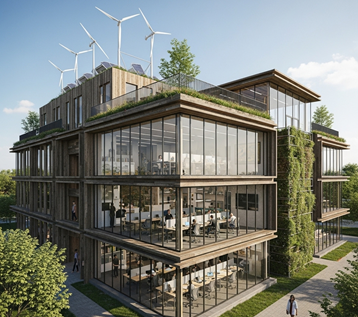The term “sustainability” has become ubiquitous, a popular buzzword in corporate boardrooms and marketing campaigns alike. But for a new generation of entrepreneurs, it’s far more than a trend; it’s the foundational principle of their business models. These visionary founders are building sustainable startups for a planet-first economy, recognizing that true long-term success isn’t measured solely by profit margins, but by their positive impact on the environment and society.
What is a Planet-First Economy?
A planet-first economy redefines value. It moves beyond the traditional, linear “take-make-dispose” model, where economic growth often comes at the expense of finite resources and ecological health. Instead, it prioritizes regenerative practices, circular systems, and equitable distribution of resources. In such an economy, businesses inherently strive to minimize their environmental footprint, uplift communities, and contribute to a healthier planet for future generations. This isn’t about sacrificing profitability, but rather integrating ecological and social responsibility into the very core of a business’s operations, design, and purpose.
The Imperative for Sustainable Startups
The urgency is clear. Climate change, resource depletion, and social inequality are pressing global challenges. Consumers are increasingly aware of these issues and are actively seeking out brands that align with their values. Investors, too, are shifting their focus, with a growing appetite for ESG (Environmental, Social, and Governance) compliant companies that demonstrate measurable impact alongside financial returns.
For startups, this translates into a powerful opportunity. By embedding sustainability from day one, they can:
- Attract and retain top talent: A purpose-driven mission resonates deeply with employees, particularly younger generations, who want their work to contribute to something meaningful.
- Enhance brand reputation and customer loyalty: Consumers are more likely to support businesses that genuinely care about the planet and people, fostering trust and long-term relationships.
- Mitigate risks and ensure long-term viability: Proactively addressing environmental and social impacts reduces regulatory risks, supply chain vulnerabilities, and the potential for reputational damage.
- Unlock new markets and innovation: Sustainability challenges often spark creative solutions, leading to innovative products, services, and business models that cater to evolving consumer demands.
- Access specialized funding: A growing ecosystem of impact investors, green funds, and government initiatives are specifically looking to support planet-first ventures.
Key Principles for Building a Planet-First Startup
Building a truly sustainable startup requires a holistic approach. It’s not about adding a “green” veneer, but about fundamental integration:
- Purpose-Driven Mission: The environmental and social impact should be central to the company’s raison d’être, not an afterthought. This mission should guide all strategic decisions.
- Circular Economy Design: Move away from linear production. Design products for longevity, repairability, and recyclability. Prioritize renewable resources and minimize waste throughout the entire lifecycle.
- Sustainable Supply Chains: Scrutinize every link in your supply chain. Partner with suppliers who adhere to ethical labor practices, source materials responsibly, and prioritize environmental protection. Local sourcing can further reduce carbon footprint.
- Resource Efficiency: Optimize energy and water usage, reduce waste generation, and embrace renewable energy sources in operations. Implement efficient processes to minimize consumption.
- Transparency and Accountability: Be open about your sustainability goals, progress, and challenges. Measure your impact, report on it honestly, and be accountable for your commitments. Avoid “greenwashing.”
- Employee Engagement and Well-being: Foster a culture that values sustainability and empowers employees to contribute to its goals. Prioritize fair wages, safe working conditions, and a healthy work-life balance.
- Community Impact: Consider the broader social impact of your business. How can you contribute positively to the communities where you operate? This could involve local job creation, educational initiatives, or philanthropic efforts.
- Innovation and Adaptability: The sustainable landscape is constantly evolving. Embrace continuous innovation to find greener solutions and be prepared to adapt your strategies as new information and technologies emerge.
Challenges and Opportunities
While the path to building a sustainable startup is promising, it’s not without its hurdles. High upfront costs for sustainable materials or technologies, difficulty in measuring and communicating impact effectively, and navigating complex regulatory landscapes can pose challenges. However, these challenges also present opportunities for differentiation and market leadership. The early movers who authentically commit to a planet-first approach will be well-positioned to thrive.
Examples of Impactful Ventures
Across the globe, inspiring sustainable startups are proving that profitability and purpose can coexist. Companies pioneering biodegradable packaging, developing plant-based alternatives to resource-intensive products, creating innovative waste-to-resource solutions, and designing eco-friendly mobility options are just a few examples. These ventures are not only addressing critical environmental issues but are also capturing market share and attracting significant investment.
The Future is Planet-First
The shift towards a planet-first economy is inevitable, driven by environmental necessity and evolving consumer and investor demands. For aspiring entrepreneurs, this isn’t just an ethical choice; it’s a strategic imperative. By building sustainable startups that go beyond the buzz, focusing on genuine impact and long-term value creation, they are not only securing their own success but also shaping a more resilient and equitable future for all. The time to build for the planet is now.
Who we are: Funded.com is a platform that is A+ BBB accredited over 10+ years. Access our network of Angel Investors, Venture Capital or Lenders. Let us professionally write your Business Plan.





 Rss Feed
Rss Feed


